#peter smith-kingsley
Text
fan fiction got me to finish watching The Talented Mr. Ripley.
I think I stopped around the second murder. I was just like ehhhh I can't handle this & also I miss Dickie.
I think I was also frustrated with Tom Ripley containing so much sweet gayness & also sociopathic violence. I think I just imagined my mom or someone who's still kind of homophobic seeing the movie & going "Yup. I knew it! Gayness corrupts! Poor straight Jude Law. Ugh Tom Ripley is such a deranged gay."
I think it was my fear of someone thinking that the gayness & the derangedness/wrongness of Ripley went together that upset me.
so anyway! I stopped watching the movie & didn't think I would finish.
but then I couldn't sleep so was like "Hey I'll see if there's any good Ripley fanfic."
I expected lots of Tom/Dickie, but there was practically none of that! instead it was Peter Peter Peter.... "Who the heck is Peter???" I thought.
so I went back to the movie for Peter. & shit. I love him so so so much. just like. look at him in that last scene when he still thinks he's safe.
he's in his pyjamas so sweet & cozy looking over his music scores or whatev. & he's like softly heartbroken because he just saw Tom kissing a girl. & he's calling him out on it but he's more sad than angry. he thought they had something. legit 5 min ago Tom was telling him this is the happiest he's ever been....
anyway! the ending. fuck. fuck. fuck.
Tom kills his chance at happiness. he's alone in the dark place he hides all his secrets in. that scene is the most horrible thing ever. the way Peter never even gets angry-- just confused. even as it's happening he cannot conceive that Tom is doing it on purpose.
& the way Tom is crying! oh my god.
so. what do I think of this movie?
I don't even know anymore.
part of me is like Ahh this is potentially harmful for how people see gay people.
& another part of me is like Holy shit this shows how hiding yourself/your queerness/trying not to take up space as your true self is actually slowly killing you/disappearing you/destroying your love & all that is good in you... the magic needs fresh air or it curdles...
& also this story is so weird!! queer stories shouldn't have to be all happy & shiny & good....
so. ambivalent?
& for some reason-- utterly obsessed.
#the talented mr. ripley#matt damon#jude law#patricia highsmith#ppl who have read the book-- should i read it?#i've heard interviews with the author where she says ripley has no conscience. is it as simple as that? cuz honestly that sounds kinda#boring#but patricia highsmith is brilliant so#peter smith-kingsley#tom ripley#dickie greenleaf
51 notes
·
View notes
Text
Posted this on Twitter first but might as well post on here too.
If they let me make a The Talented Mr Ripley adaptation this is who I’d cast!
#my twt username is filmdelon ermmm#yeah anyways i'm really passionate about this fancast like in my mind it's perfect#the talented mr. ripley#the talented mr ripley#tom ripley#dickie greenleaf#marge sheerwood#freddie miles#meredith logue#peter smith-kingsley#fancast#my edits#ig?'?#by me
45 notes
·
View notes
Text
'Is Tom Ripley gay? For nearly 70 years, the answer has bedeviled readers of Patricia Highsmith’s 1955 thriller The Talented Mr. Ripley, the story of a diffident but ambitious young man who slides into and then brutally ends the life of a wealthy American expatriate, as well as the four sequels she produced fitfully over the following 36 years. It has challenged the directors — French, British, German, Italian, Canadian, American — who have tried to bring Ripley to the screen, including in the latest adaptation by Steven Zaillian, now on Netflix. And it appears even to have flummoxed Ripley’s creator, a lesbian with a complicated relationship to queer sexuality. In a 1988 interview, shortly before she undertook writing the final installment of the series, Ripley Under Water, Highsmith seemed determined to dismiss the possibility. “I don’t think Ripley is gay,” she said — “adamantly,” in the characterization of her interviewer. “He appreciates good looks in other men, that’s true. But he’s married in later books. I’m not saying he’s very strong in the sex department. But he makes it in bed with his wife.”
The question isn’t a minor one. Ripley’s killing of Dickie Greenleaf — the most complicated, and because it’s so murkily motivated, the most deeply rattling of the many murders the character eventually commits — has always felt intertwined with his sexuality. Does Tom kill Dickie because he wants to be Dickie, because he wants what Dickie has, because he loves Dickie, because he knows what Dickie thinks of him, or because he can’t bear the fact that Dickie doesn’t love him? Ordinarily, I’m not a big fan of completely ignoring authorial intent, and I’m inclined to let novelists have the last word on factual information about their own creations. But Highsmith, a cantankerous alcoholic misanthrope who was long past her best days when she made that statement, may have forgotten, or wanted to disown, her own initial portrait of Tom Ripley, which is — especially considering the time in which it was written — perfumed with unmistakable implication.
Consider the case that Highsmith puts forward in The Talented Mr. Ripley. Tom, a single man, lives a hand-to-mouth existence in New York with a male roommate who is, ahem, a window dresser. Before that, he lived with an older man with some money and a controlling streak, a sugar daddy he contemptuously describes as “an old maid”; Tom still has the key to his apartment. Most of his social circle — the names he tosses around when introducing himself to Dickie — are gay men. The aunt who raised him, he bitterly recalls, once said of him, “Sissy! He’s a sissy from the ground up. Just like his father!” Tom, who compulsively rehearses his public interactions and just as compulsively relives his public humiliations, recalls a particularly stinging moment when he was shamed by a friend for a practiced line he liked to use repeatedly at parties: “I can’t make up my mind whether I like men or women, so I’m thinking of giving them both up.” It has “always been good for a laugh, the way he delivered it,” he thinks, while admitting to himself that “there was a lot of truth in it.” Fortunately, Tom has another go-to party trick. Still nurturing vague fantasies of becoming an actor, he knows how to delight a small room with a set of monologues he’s contrived. All of his signature characters are, by the way, women.
This was an extremely specific set of ornamentations for a male character in 1955, a time when homosexuality was beginning to show up with some frequency in novels but almost always as a central problem, menace, or tragedy rather than an incidental characteristic. And it culminates in a gruesome scene that Zaillian’s Ripley replicates to the last detail in the second of its eight episodes: The moment when Dickie, the louche playboy whose luxe permanent-vacation life in the Italian coastal town of Atrani with his girlfriend, Marge, has been infiltrated by Tom, discovers Tom alone in his bedroom, imitating him while dressed in his clothes. It is, in both Highsmith’s and Zaillian’s tellings, as mortifying for Tom as being caught in drag, because essentially it is drag but drag without exaggeration or wit, drag that is simply suffused with a desire either to become or to possess the object of one’s envy and adoration. It repulses Dickie, who takes it as a sexual threat and warns Tom, “I’m not queer,” then adds, lashingly, “Marge thinks you are.” In the novel, Tom reacts by going pale. He hotly denies it but not before feeling faint. “Nobody had ever said it outright to him,” Highsmith writes, “not in this way.” Not a single gay reader in the mid-1950s would have failed to recognize this as the dread of being found out, quickly disguised as the indignity of being misunderstood.
And it seemed to frighten Highsmith herself. In the second novel, Ripley Under Ground, published 15 years later, she backed away from her conception of Tom, leaping several years forward and turning him into a soigné country gentleman living a placid, idyllic life in France with an oblivious wife. None of the sequels approach the cold, challenging terror of the first novel — a challenge that has been met in different ways, each appropriate to their era, by the three filmmakers who have taken on The Talented Mr. Ripley. Zaillian’s ice-cold, diamond-hard Ripley just happens to be the first to deliver a full and uncompromising depiction of one of the most unnerving characters in American crime fiction.
The first Ripley adaptation, René Clément’s French-language drama Purple Noon, is much beloved for its sun-saturated atmosphere of endless indolence and for the tone of alienated ennui that anticipated much of the decade to come; the movie was also a showcase for its Ripley, the preposterously sexy, maddeningly aloof Alain Delon. And therein lies the problem: A Ripley who is preposterously sexy is not a Ripley who has ever had to deal with soul-deep humiliation, and a Ripley who is maddeningly aloof is not going to be able to worm his way into anyone’s life. Purple Noon is not especially willing (or able — it was released in 1960) to explore Ripley’s possible homosexuality. Though the movie itself suggests that no man or woman could fail to find him alluring, what we get with Delon is, in a way, a less complex character type, a gorgeous and magnetic smooth criminal who, as if even France had to succumb to the hoariest dictates of the Hollywood Production Code, gets the punishment due to him by the closing credits. It’s delectable daylit noir, but nothing unsettling lingers.
Anthony Minghella’s The Talented Mr. Ripley, released in 1999, is far better; it couldn’t be more different from the current Ripley, but it’s a legitimate reading that proves that Highsmith’s novel is complex and elastic enough to accommodate wildly varying interpretations. A committed Matt Damon makes a startlingly fine Tom Ripley, ingratiating and appealing but always just slightly inept or needy or wrong; Jude Law — peak Jude Law — is such an effortless golden boy that he manages the necessary task of making Damon’s Tom seem a bit dim and dull; and acting-era Gwyneth Paltrow is a spirited and touchingly vulnerable Marge.
Minghella grapples with Tom’s sexual orientation in an intelligently progressive-circa-1999 way; he assumes that Highsmith would have made Tom overtly gay if the culture of 1955 had allowed it, and he runs all the way with the idea. He gives us a Tom Ripley who is clearly, if not in love with Dickie, wildly destabilized by his attraction to him. And in a giant departure from the novel, he elevates a character Highsmith had barely developed, Peter Smith-Kingsley (played by Jack Davenport) into a major one, a man with whom we’re given to understand that Ripley, with two murders behind him and now embarking on a comfortable and well-funded European life, has fallen in love. It doesn’t end well for either of them. A heartsick Tom eventually kills Peter, too, rather than risk discovery — it’s his third murder, one more than in the novel — and we’re meant to take this as the tragedy of his life: That, having come into the one identity that could have made him truly happy (gay man), he will always have to subsume it to the identity he chose in order to get there (murderer). This is nowhere that Highsmith ever would have gone — and that’s fine, since all of these movies are not transcriptions but interpretations. It’s as if Minghella, wandering around inside the palace of the novel, decided to open doors Highsmith had left closed to see what might be behind them. The result is the most touching and sympathetic of Ripleys — and, as a result, far from the most frightening.
Zaillian is not especially interested in courting our sympathy. Working with the magnificent cinematographer Robert Elswit, who makes every black-and-white shot a stunning, tense, precise duel between light and shadow, he turns coastal Italy not into an azure utopia but into a daunting vertical maze, alternately paradise, purgatory, and inferno, in which Tom Ripley is forever struggling; no matter where he turns, he always seems to be at the bottom of yet another flight of stairs.
It’s part of the genius of this Ripley — and a measure of how deeply Zaillian has absorbed the book — that the biggest departures he makes from Highsmith somehow manage to bring his work closer to her scariest implications. There are a number of minor changes, but I want to talk about the big ones, the most striking of which is the aging of both Tom and Dickie. In the novel, they’re both clearly in their 20s — Tom is a young striver patching together an existence as a minor scam artist who steals mail and impersonates a collection agent, bilking guileless suckers out of just enough odd sums for him to get by, and Dickie is a rich man’s son whose father worries that he has extended his post-college jaunt to Europe well past its sowing-wild-oats expiration date. Those plot points all remain in place in the miniseries, but Andrew Scott, who plays Ripley, is 47, and Johnny Flynn, who plays Dickie, is 41; onscreen, they register, respectively, as about 40 and 35.
This changes everything we think we know about the characters from the first moments of episode one. As we watch Ripley in New York, dourly plying his miserable, penny-ante con from a tiny, barren shoe-box apartment that barely has room for a bed as wide as a prison cot (this is not a place to which Ripley has ever brought guests), we learn a lot: This Ripley is not a struggler but a loser. He’s been at this a very long time, and this is as far as he’s gotten. We can see, in an early scene set in a bank, that he’s wearily familiar with almost getting caught. If he ever had dreams, he probably buried them years earlier. And Dickie, as a golden boy, is pretty tarnished himself — he isn’t a wild young man but an already-past-his-prime disappointment, a dilettante living off of Daddy’s money while dabbling in painting (he’s not good at it) and stringing along a girlfriend who’s stuck on him but probably, in her heart, knows he isn’t likely to amount to much.
Making Tom older also allows Zaillian to mount a persuasive argument about his sexuality that hews closely to Highsmith’s vision (if not to her subsequent denial). If the Ripley of 1999 was gay, the Ripley of 2024 is something else: queer, in both the newest and the oldest senses of the word. Scott’s impeccable performance finds a thousand shades of moon-faced blankness in Ripley’s sociopathy, and Elswit’s endlessly inventive lighting of his minimal expressions, his small, ambivalent mouth and high, smooth forehead, often makes him look slightly uncanny, like a Daniel Clowes or Charles Burns drawing. Scott’s Ripley is a man who has to practice every vocal intonation, every smile or quizzical look, every interaction. If he ever had any sexual desire, he seems to have doused it long ago. “Is he queer? I don’t know,” Marge writes in a letter to Dickie (actually to Tom, now impersonating his murder victim). “I don’t think he’s normal enough to have any kind of sex life.” This, too, is from the novel, almost word for word, and Zaillian uses it as a north star. The Ripley he and Scott give us is indeed queer — he’s off, amiss, not quite right, and Marge knows it. (In the novel, she adds, “All right, he may not be queer [meaning gay]. He’s just a nothing, which is worse.”) Ripley’s possible asexuality — or more accurately, his revulsion at any kind of expressed sexuality — makes his killing of Dickie even more horrific because it robs us of lust as a possible explanation. This is the first adaptation of The Talented Mr. Ripley I’ve seen in which even Ripley may not know why he murders Dickie.
When I heard that Zaillian (who both wrote and directed all of the episodes) was working on a Ripley adaptation, I wondered if he might replace sexual identity, the great unequalizer of 1999, with economic inequity, a more of-the-moment choice. Minghella’s version played with the idea; every person and object and room and vista Damon’s Ripley encountered was so lush and beautiful and gleaming that it became, in some scenes, the story of a man driven mad by having his nose pressed up against the glass that separated him from a world of privilege (and from the people in that world who were openly contemptuous of his gaucheries). Zaillian doesn’t do that — a lucky thing, since the heavily Ripley-influenced film Saltburn played with those very tropes recently and effectively. Whether intentional or not, one side effect of his decision to shoot Ripley in black and white is that it slightly tamps down any temptation to turn Italy into an occasion for wealth porn and in turn to make Tom an eat-the-rich surrogate. This Italy looks gorgeous in its own way, but it’s also a world in which even the most beautiful treasures appear threatened by encroaching dampness or decay or rot. Zaillian gives us a Ripley who wants Dickie’s life of money and nice things and art (though what he’s thinking when he stares at all those Caravaggios is anybody’s guess). But he resists the temptation to make Dickie and Marge disdainful about Tom’s poverty, or mean to the servants, or anything that might make his killing more palatable. This Tom is not a class warrior any more than he’s a victim of the closet or anything else that would make him more explicable in contemporary terms. He’s his own thing — a universe of one.
Anyway, sexuality gives any Ripley adapter more to toy with than money does, and the way Zaillian uses it also plays effectively into another of his intuitive leaps — his decision to present Dickie’s friend and Tom’s instant nemesis Freddie Miles not as an obnoxious loudmouth pest (in Minghella’s movie, he was played superbly by a loutish Philip Seymour Hoffman) but as a frosty, sexually ambiguous, gender-fluid-before-it-was-a-term threat to Tom’s stability, excellently portrayed by Eliot Sumner (Sting’s kid), a nonbinary actor who brings perceptive to-the-manor-born disdain to Freddie’s interactions with Tom. They loathe each other on sight: Freddie instantly clocks Tom as a pathetic poser and possible closet case, and Tom, seeing in Freddie a man who seems to wear androgyny with entitlement and no self-consciousness, registers him as a danger, someone who can see too much, too clearly. This leads, of course, to murder and to a grisly flourish in the scene in which Tom, attempting to get rid of Freddie’s body, walks his upright corpse, his bloodied head hidden under a hat, along a street at night, pretending he’s holding up a drunken friend. When someone approaches, Tom, needing to make his possible alibi work, turns away, slamming his own body into Freddie’s up against a wall and kissing him passionately on the lips. That’s not in Highsmith’s novel, but I imagine it would have gotten at least a dry smile out of her; in Ripley’s eight hours, this necrophiliac interlude is Tom’s sole sexual interaction.
No adaptation of The Talented Mr. Ripley would work without a couple of macabre jokes like that, and Zaillian serves up some zesty ones, including an appearance by John Malkovich, the reigning king/queen of sexual ambiguity (and himself a past Ripley, in 2002’s Ripley’s Game), nodding to Tom’s future by playing a character who doesn’t show up until book two. He also gives us a witty final twist that suggests that Ripley may not even make it to that sequel, one that reminds us how fragile and easily upended his whole scheme has been. Because Ripley, in this conception, is no mastermind; Zaillian’s most daring and thoughtful move may have been the excision of the word “talented” from the title. In the course of the show, we see him toy with being an editor, a writer (all those letters!), a painter, an art appreciator, and a wealthy man, often convincingly — but always as an impersonation. He gives us a Tom who is fiercely determined but so drained of human affect when he’s not being watched that we come to realize that his only real skill is a knack for concentrating on one thing to the exclusion of everything else. What we watch him get away with may be the first thing in his life he’s really good at (and the last moment of the show suggests that really good may not be good enough). This is not a Tom with a brilliant plan but a Tom who just barely gets away with it, a Tom who can never relax.
Tom’s sexuality is ultimately an enigma that Zaillian chooses to leave unsolved — as it remains at the end of the novel. Highsmith’s decision to turn Tom into a roguish heterosexual with a taste for art fraud before the start of the second novel has never felt entirely persuasive, and it’s clearly a resolution in which Zaillian couldn’t be less interested. Toward the end of Ripley, Tom is asked by a detective to describe the kind of man Dickie was. He transforms Dickie’s suspicion about his queerness into a new narrative, telling the private investigator that Dickie was in love with him: “I told him I found him pathetic and that I wanted nothing more to do with him.” But it’s the crushing verdict he delivers just before that line that will stay with me, a moment in which Tom, almost in a reverie, might well be describing himself: “Everything about him was an act. He knew he was supremely untalented.” In the end, Scott and Zaillian give us a Ripley for an era in which evil is so often meted out by human automatons with even tempers and bland self-justification: He is methodical, ordinary, mild, and terrifying.'
#Andrew Scott#Ripley#Matt Damon#The Talented Mr Ripley#Anthony Minghella#Steven Zaillian#Purple Noon#Alain Delon#Johnny Flynn#Dickie Greenleaf#Peter Smith-Kingsley#Jude Law#Gwyneth Paltrow#Robert Elswit#Caravaggio#Marge Sherwood#Freddie Miles#Philip Seymour Hoffman#Eliot Sumner
6 notes
·
View notes
Text
being completely normal about jack davenport in the talented mr ripley
#its been years since i saw this film#and watching it again now definitely brings with it a certain . .appreciation#the talented mr. ripley#jack davenport#peter smith-kingsley#matt damon#tom ripley
111 notes
·
View notes
Text

literally sooooo in love,,
#f i n a l l y posting some tmr art aaaaa.....#the original sketches for these are actually almost a year old 😔 b u t i've gotten the hang of drawing them since then#ughhh i love these two so much....... i'm a believer that they deserved their ending together#mutual and immediately reciprocated feelings... they're down hard for each other.......#also i just love tom a lot in general (and peter too of course) ... great characters aaaaa#not sure how often i'll post tmr art b u t when i do it'll usually be tom or them or silly stuff aaaa ......#the talented mr. ripley#tom ripley#peter smith-kingsley#petom#flygon used sketch#also i draw tom in glasses about 99% of the time because tom in glasses is my f a v o r i t e tom i feel so validated
71 notes
·
View notes
Text

This was done for the 30 Days of Doing Shipping Wrong meme: "They are the worst possible thing to happen to each other" ship.

Above is their meetcute. I'm not even going to cheapen this post by pointing out that the second image down on the right is how Peter looks when he's saying to Tom, "I heard you were desperate to come." And the third image down, on the left, is how he looks when he's saying, "I was rather looking forward to rowing you around."

It's always good to remember this: Peter stands in the light. While Tom stands in the dark.
But here's Peter, welcoming Tom into his world. And Tom, being immensely good at reading the cards in other people's hands, knows that if he acts like the little bird with the broken wing, that Peter will be absolutely helpless to come to his rescue. That he'll keep the bird within the palms of his hands, and guard it well.
See, pretending to be weak, around someone who can become quite protective, means wielding a power over that person far greater than if one were to approach someone such as Peter, as a man of power. Luckily for Tom, he's exactly the type of person that people don't mind being over-powered by (knowingly or not). At least for people such as Peter, Meredith, and myself.
Peter, unfortunately, places himself on the chopping block when he brings up the rumor that Tom may have been killed. I think that Tom is even a little offended that after he put so much work into Dickie's letter to Tom, and that in general, anyone could believe that Dickie could possibly kill him. Him, whom Dickie loves. Like a 'brother'. And for a moment, Tom seems like he might lose his cool, but then he smiles, nervously, and Peter restores their balance by saying the idea of it is absolutely ridiculous.

More insight on the light vs. dark issue in costuming, as well as more insight into what goes into Tom portraying himself as vulnerable.
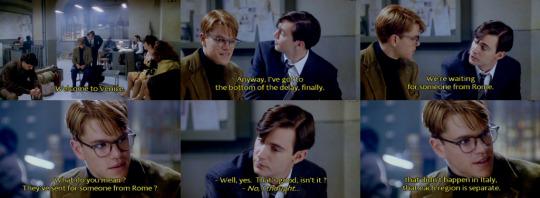
And though Peter welcomed Tom into his light-bound, open arms, Tom has immediately pulled Peter into the dark underbelly, where he now lives.
Here's the thing. Tom is just a person. He may be... more or less evil, but he is just a person. However, his life depends on whether or not he can fool everyone into believing that he's done nothing wrong. So when he cracks in front of Peter - when he shows that fear cropping up because they've sent for someone from Rome (someone who might know him as Dickie) - I'd like to think it's because there's this part of Tom that just feels so comfortable with Peter. Now, who wouldn't? Peter is nurturing and caring, and genuinely kind. But for Tom to break in front of Peter for even a moment, without the threat of killing Peter after. I think it's somewhat special. He's showing his fear in a normal human capacity, which begs for comfort. Comfort from Peter.
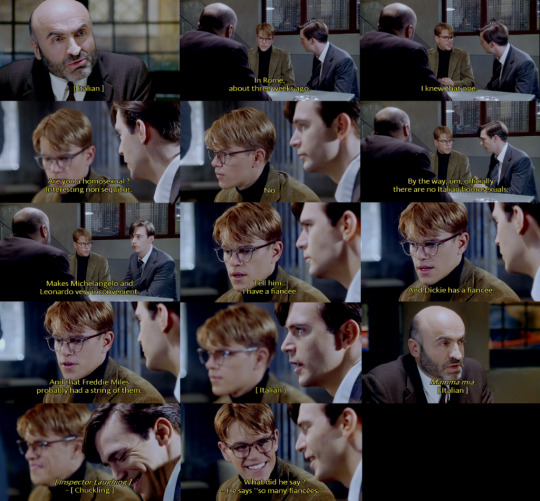
Here, you see that Tom is actually quite good at understanding Italian. That he answered is a slip, a mistake because he's nervous. It reaffirms that the language barrier was a part of feigning his broken wing.
From here, Peter takes Tom's charming smile, and then translates throughout the rest of the conversation.
I'm afraid I must admit. There is one part of Tom I still haven't quite figured out after all these years. I suppose Tom thought it would make him look more guilty to admit that he has homosexual desires. And you see his denial throughout practically the entire movie - I guess because some people just aren't ready to admit who they are. Tom, especially. But it always seemed like the least of his problems... In any case, he says no. In front of Peter no less, who seems to take the answer to be one striving for privacy, rather than truth. Because he is not pleased with the question, himself. In fact, he makes a quip to lighten the mood, and put Tom at ease. It never even comes up later, which I think is especially sweet of Peter. He just takes Tom's wishes in stride.
But let me not wax on about how adorable Peter is with Tom. Because this is supposed to be why this ship is all wrong. And god is it wrong.
Then Tom ignores the way Peter tries to swaddle him, and tells Peter a lie - to lie for him, and say that he has a fiance. Which, I think, Peter is surprised to hear, and perhaps a little hurt, though he continually goes with the flow of things. But yet again, he never forces the subject later on. He respects Tom too much to do so. Or perhaps considers Tom too fragile. Either way, it is for Tom's sake.
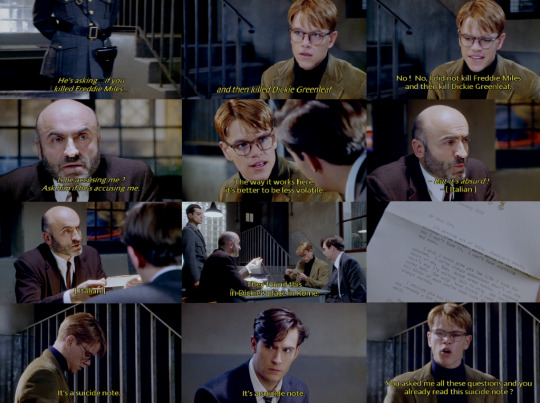
I'd like to say that I find it interesting that, here, Tom chooses not to lie. No. He did not kill Freddie and then Dickie.
By asking Peter, frantically, to ask if the Inspector is accusing him, he is begging Peter to place himself in front of Tom, to protect him again. The very reason he brought Peter with him. He's merely putting on a show.
That's when the Inspector pulls out the letter Tom wrote in Dickie's name.
Here, I couldn't say for sure. I feel that Peter's expression, upon finding out it's a 'suicide note' is one of anger, and of disbelief. Anger, perhaps for Tom, for the same reasons Tom expresses as he shouts afterward. And disbelief because all the time he's known Dickie... he'd never kill himself. Or that's what he thought, anyway. I think it's probably a little of both. Which can be confusing, contradicting, and cloud the mind a little.

Now, this scene is arguably everyone's favorite.
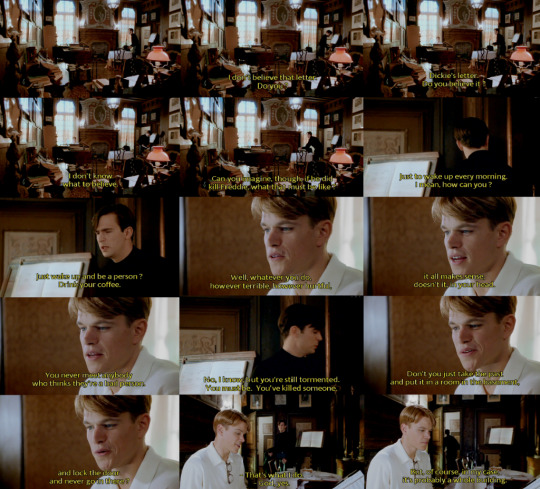
I think I'll mainly let it speak for itself. It starts with the fact that Peter shows what is, conceivably, sympathy for someone who may have killed. A situation which Tom, himself, is in, and perhaps expects not to be sympathized with at all. And Tom, despite everything, feels like he can divulge certain pieces of truth to Peter, that to anyone else, he would hide.
He makes him feel human. Not like a demon.
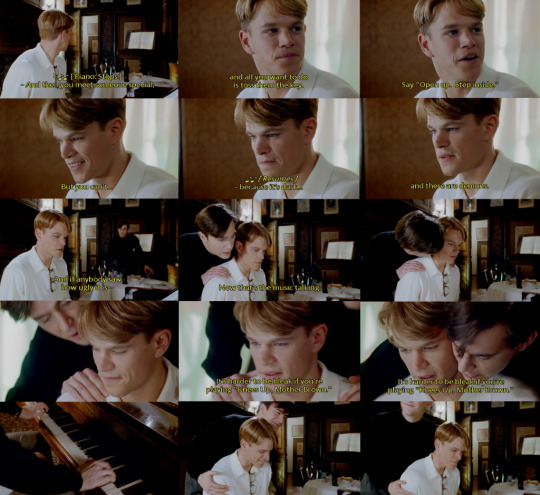
But of course... If Peter needs a whole building to hide his sins, then how big of a space must Tom's take up? So Tom has to fish for some more reassurance. And it may seems as if Tom is just playing, acting, again, but there's a buried, harsh, and painful truth beneath the words he says.
The sadness, the longing in Tom's eyes - was never a lie.
It honestly disturbs Tom, I think, that Peter allows Tom to feel... loved, and genuinely accepted. Not 'allows him', actually, but forces the love upon him. Something Tom has denied himself, possibly forever, and which will cause the greatest feeling of loss and utter self-hatred that Tom will ever feel. Meanwhile, he nearly convinces Peter that Peter is his One, which lulls Peter into a sense of false hope. A sense of trusting, and the future of being together, close and loved.

May I reiterate? Peter is the light.

But if Peter is the light, and Tom is the dark - and if Tom lets the light in, to conquer the dark...

This is mostly just because I'm in love with the song here. Here is a version done by a Slovak philharmonic orchestra and choir, with a translation of the gorgeous lyrics.
There is one lyric of the song which says: Lord, have mercy on him [the guilty man to be judged]. Not only is Peter in the 'choir' asking for this; he is at the center of it. Looking down at Tom. The song then goes on to say: Grant them [presumably those whom the guilty man caused harm] eternal rest. Stating that they would only have rest, not if the guilty man were judged, but if he were judged mercifully.
At this unspecified moment in time, Peter has already fallen completely for Tom. And perhaps Tom, Peter.
I'd like to think this is a full representation of them in the after life. Tom comes in, below Peter leading a choir of angels, pleading with the Lord to grant Tom mercy. And Peter looks down, and sees him, and Tom smiles, and waves, and Peter smiles, and then turns back to the Lord while Tom watches in utter awe at the fact that someone is rooting for him. For him.

Excuse me while I cry over both of their smiles as Peter says he and Tom found each other.
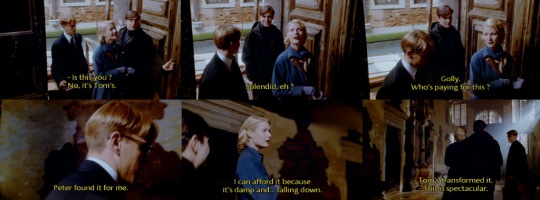
I feel quite bad for Marge. It's a bit like throwing her into the lion's den. But Peter is stupidly proud of Tom so... He doesn't even realize what he's doing. I mean... Seriously, do you see how much Peter's cheeks are bulging from his smile after Tom says Peter found the place for him? Just... I think from this point on I'm going to disintegrate into unintelligible sounds.

"It's better than trying to squeeze into my room." Somehow I doubt Tom would agree, if it were him.
Of course, Marge goes on to be a startling reminder of who Tom really is.

The funny thing is (it's not funny) that Tom will act weak in front of Peter in order to gain his protection, but when he could truly use some protection and comfort, he becomes shy about it, and refuses Peter's warmth. Much to Peter's disappointment. And Tom's, I guarantee you. Okay, so he refuses to a point. And then they make bedroom eyes at each other and I want to kill myself.


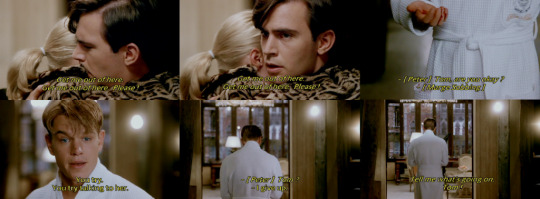
It's Marge who's shaking and crying in his arms, but Peter wants to know if Tom is okay.

My insufficient theory on why it was Peter who Tom was thinking about when he was in the bath. Worrying about, even. Wanting. Romantically. Sort of. Maybe.

This scene would have been much better if Peter had kissed Tom's forehead at the end. Still, it's sweet how he gently rubs the bandage on.
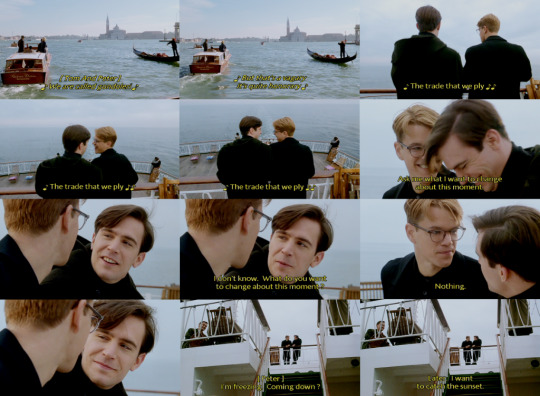
NOPE. I may actually vomit in a moment.

This is the end. As soon as it sinks in that someone is calling Dickie's name; the end is coming.
"Are you alone?" he asks, with dim hope, and his heart in his throat.
And that's when he knows. He shakes his head, almost imperceptibly. His world is crashing down...

I actually hate everything. Fucking shit, I did not want to cry while doing this... But I'm here to do a job - oh look, Tom's mouth is fucking turned down I wonder the fuck why.
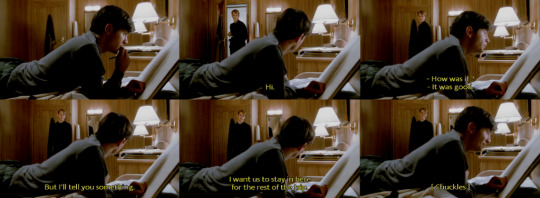
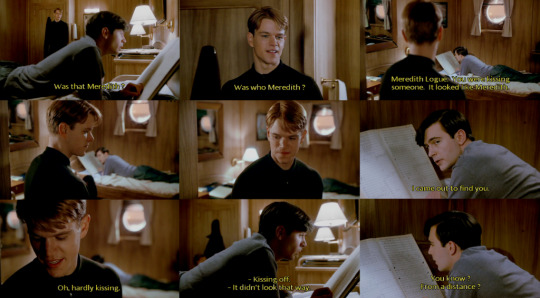
The way his voice wavers over 'good'.
I can't breathe. Which is fitting.

The destruction, the panic I feel from seeing one strip of cloth. I fucking...
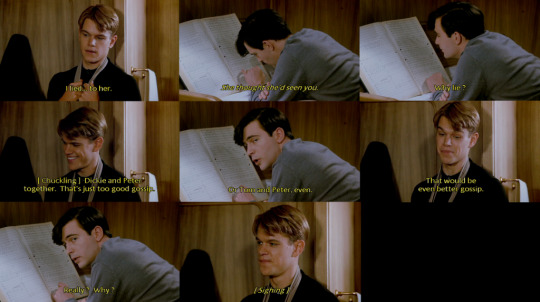
He is, in fact, so panicked himself, that he slips up again, calling himself Dickie. He becomes dissociative. If he's Dickie, he's not in love with Peter, and this won't hurt, what he's about to do. But Peter corrects him, and there's nothing left to do. But the thing is... Tom no longer exists. At least, in a few minutes, he won't.

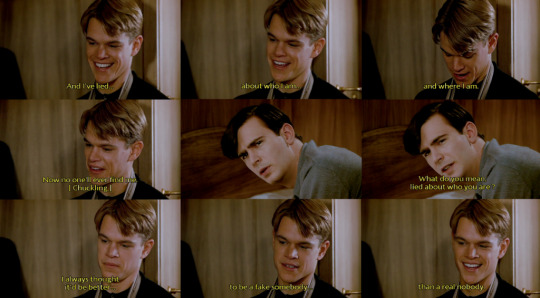
At least this ends with my favorite line.

I might definitely vomit.
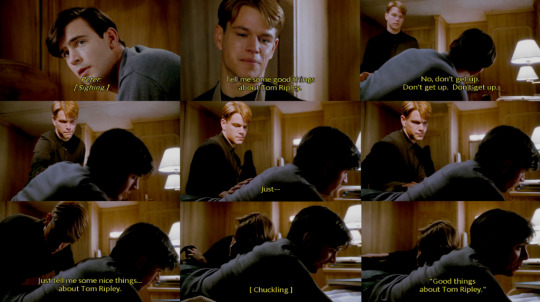
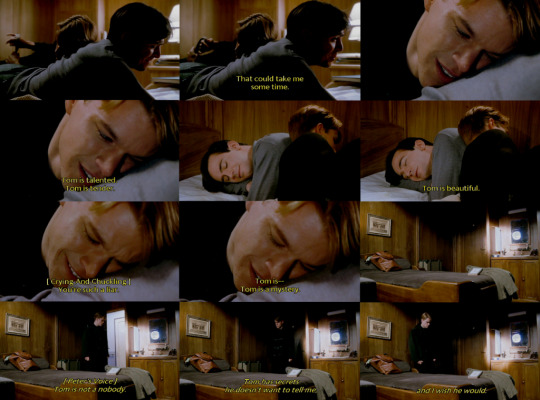
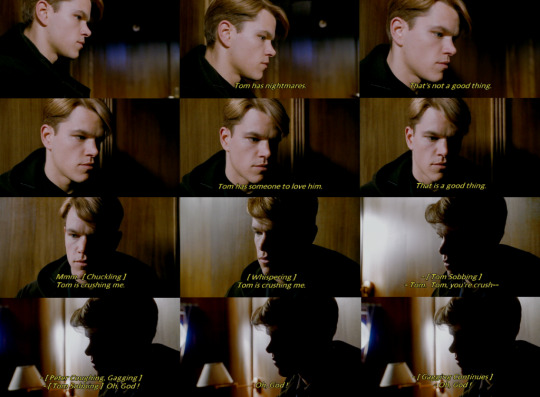
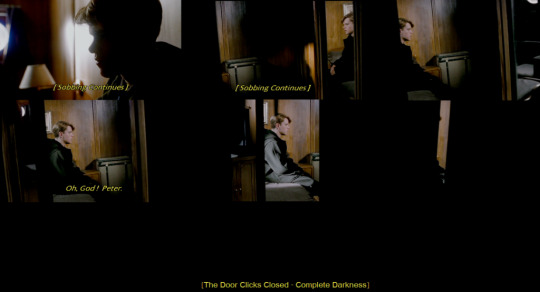


More impressions on the - situation.
And here is another, prettier picspam.
#suicide mention#vomit mention#ship manifesto#the talented mr. ripley#tom ripley#peter smith-kingsley#peter/tom#picspam#gay#major character death#canonical character death#strangulation tw
7 notes
·
View notes
Link
I've decided I'm going to start promoting my fics on here
A rewrite of the ending scene. Tom has someone to love.
4 notes
·
View notes
Text
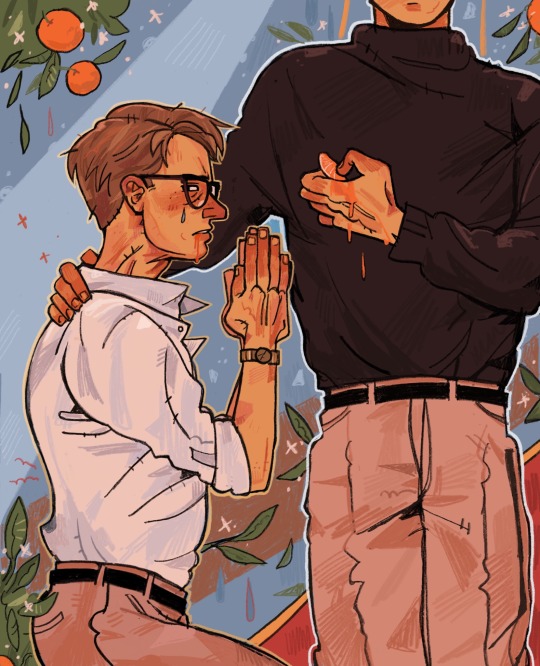
i forgot to post this…. devastating!!! been really really busy recently hence the lack of art… :(
#ok yes and this is fic art for a monstrosity that’s been in my drafts for so long#cam art#fanart#the talented mr. ripley#tom ripley#peter smith kingsley#talented mr ripley#ok ok ok
443 notes
·
View notes
Text
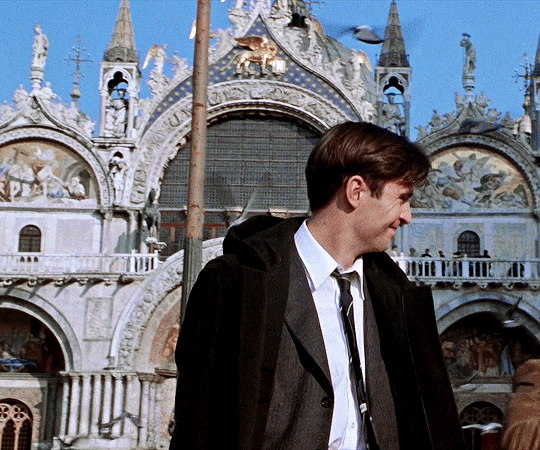
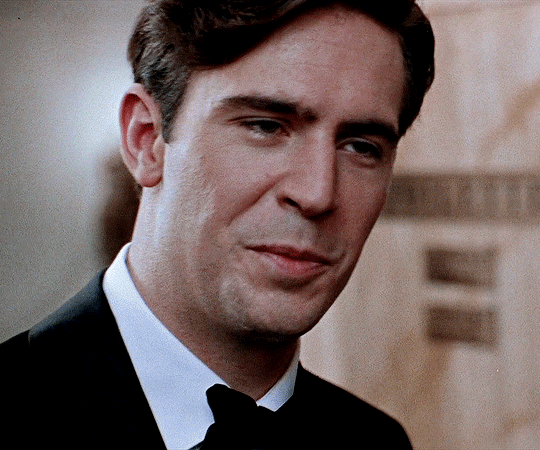
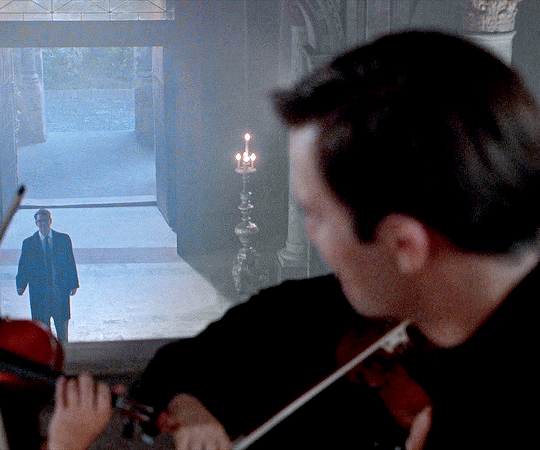


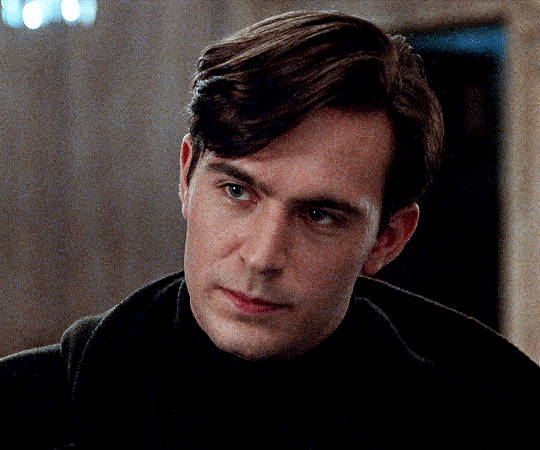
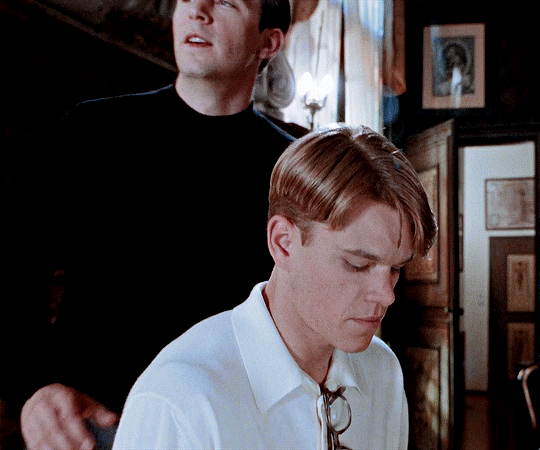
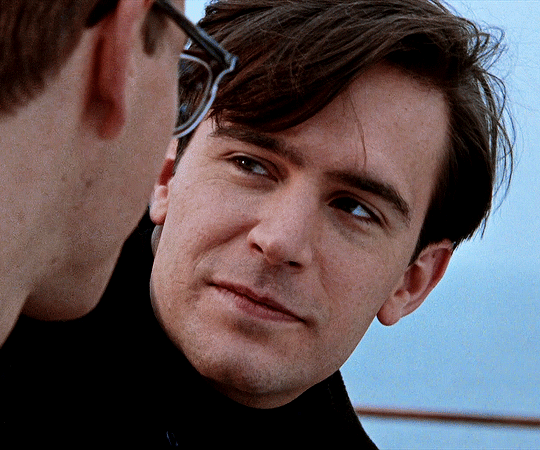
Jack Davenport as Peter Smith-Kingsley
THE TALENTED MR. RIPLEY (1999) dir. Anthony Minghella
#filmedit#ttmredit#perioddramaedit#the talented mr. ripley#jack davenport#peter smith kingsley#**#*gif#*ttmr#🙃
178 notes
·
View notes
Photo


Tom Ripley & Peter Smith-Kingsley
1999 • The Talented Mr. Ripley • dir. Anthony Minghella
#the talented mr. ripley#tom ripley#peter smith kingsley#perioddramaedit#filmedit#lgbtedit#gay couple#gay#lgbt#queer#anthony minghella#patricia highsmith#queer characters#1950s#film#movie#period drama#filmgifs#moviegifs#romancegifs#queer media#couple#affection#intimacy#longing#romantic
708 notes
·
View notes
Text
I absolutely love the ending of The Talented Mr Ripley.
I love that Tom was able to trust Peter enough to tell him about his past and I love that Peter basically said "Y'know what, I love you no matter what. You are smart, sexy, talented and Dickie and Freddie were kind of assholes, so they should've seen it coming." And the next day they watch the sunset on the boat together. And when Meredith shows up, Tom is all like "Hey, look who I found on the boat?" and Peter played along "Such a coincidence we were on this boat together, and yet Dickie and I have decided are getting married next month" and Meredith was all like "I can't blame either of you. Can I be maid of honour?" and she was and they lived happily ever after.
Truly a classic.
210 notes
·
View notes
Text
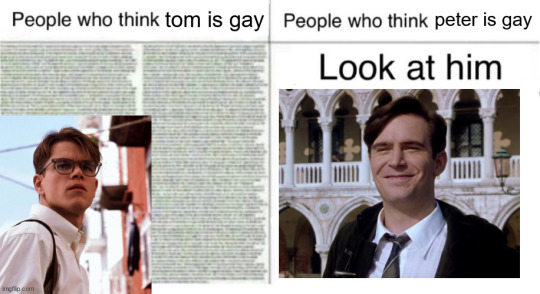
#.txt#the talented mr. ripley#sorry for the horrific quality google was NOT helping me find the original meme template </3#tom ripley#peter smith kingsley#matt damon#talented mr ripley
386 notes
·
View notes
Text
'New to Netflix on April 4, 2024, Ripley is the third adaptation of Patricia Highsmith's acclaimed 1955 novel The Talented Mr. Ripley. The story concerns Tom Ripley (Andrew Scott), a wily forger and con man who steals the identity of the wealthy European playboy Dickie Greenleaf (Johnny Flynn) and lives a life of luxury. Although it's the first TV translation of the classic crime story, the Netflix original series joins the 1960 French film Purple Noon and the 1999 American movie The Talented Mr. Ripley as fictional adaptations.
However, while each mostly remains faithful to Highsmith's novel, several significant differences regarding the ending can be found. In particular, the final moments of Ripley's grand scheme conclude on a much different note in the 1999 film and the 2024 TV show. For those interested in the chief differences between the two acclaimed adaptations, it's time for a side-by-side comparison between Ripley's criminal endeavors and how faithful they remain to Highsmith's novel.
What is The Talented Mr. Ripley?
Published in November 1955, The Talented Mr. Ripley is a crime novel by Patricia Highsmith. The acclaimed psychological thriller concerns Tom Ripley, a small-time con artist and grifter scraping by in New York City in the late 1950s and early 1960s. Ripley's dead-end life changes for the better when he is hired by shipping tycoon Herbert Greenleaf. Herbert believes Ripley attended school with his son, Dickie Greenleaf, whose whereabouts in Europe are unknown. Herbert hires Ripley to find Dickie, paying for his travel expenses and giving him a salary for his efforts.
Once Ripley locates Dickie and his friend Marge Sherwood in Italy, Ripley slowly ingratiates his way into their lives. Upon witnessing the lap of luxury Dickie lives in, Ripley slowly schemes to steal Dickie's identity and live his lavish lifestyle of wealth and privilege. In Highsmith's novel, the most crucial event occurs off the coast of San Remo, where Ripley murders Dickie in cold blood on a small fishing boat with an oar.
After killing him, Ripley takes Dickie's possessions, throws his anchor-tied body into the water, and deliberately sinks the boat. Ripley continues to live off Dickie's trust fund, enjoys his wealthy lifestyle, and constantly changes his disguise to resemble Dickie. Meanwhile, Ripley communicates with Dickie's friends and family to assure them he's still alive.
In both Anthony Minghella's 1999 film adaptation and Steve Zaillian's 2024 Netflix TV show, Highsmith's story is faithfully told up to this point. The big difference in the TV and film adaptation comes during the final act. While Ripley ultimately gets away with his criminal charade, a few minor story beats have been altered from the text. In addition to Ripley's ambiguous fate, some details regarding Dickie's corpse, the murder weapons, and the boat disposal stand out.
Differences Between Ripley and The Talented Mr. Ripley
Although Ripley faithfully retells Highsmith's novel almost verbatim, notable differences become clear during the fatal boat ride. In the novel and the 1999 movie, Ripley (Matt Damon) sinks a small fishing boat underwater following Dickie's (Jude Law) murder. In the show, Ripley attempts to burn the boat with petroleum but only partially succeeds. After his plan fails, Ripley stacks rocks in the boat until it submerges underwater. In the novel, movie, and TV show, Ripley continues to live as Dickie in an apartment in Rome and Venice as the final act approaches. However, in the movie, Dickie's corpse is found by the police. In the TV show, Dickie's corpse is never found.
Another minor difference between Ripley and The Talented Mr. Ripley relates to the death of Dickie's longtime friend, Freddie Miles. When Freddie becomes suspicious of Ripley's activity and confronts him about Dickie's whereabouts in Rome, Ripley murders him in cold blood inside his apartment. In the novel, Ripley bludgeons Freddie to death in the head with a big glass ashtray.
However, in the movie, Ripley fatally bashes Freddie (Philip Seymour Hoffman) with the head of a marble statue. In the TV show, Ripley bludgeons Freddie (Eliot Somner) to death with a paperweight. Although the murder weapon has been changed, the Roman location and the way Ripley murders Freddie more or less remain the same in all three adaptations.
The Ending of Ripley vs. The Talented Mr. Ripley
The most substantial difference between Ripley and The Talented Mr. Ripley comes during the finale. In the novel, Ripley convinces Dickie's family that Dickie murdered Freddie before committing suicide. Ripley ends up sailing to Greece after forging Dickie's will and inheriting his fortune. Ripley gets away with his crimes and secures enough money to enjoy a wealthy life. However, his life of luxury is marred by the fear and paranoia of being caught as he constantly looks over his shoulder.
In the 1999 movie, Ripley also ends up in Greece, but the story veers from the novel quite dramatically. In the final moments, a friend of Marge named Peter Smith-Kingsley joins Ripley on the ocean liner to Greece. Upon confronting Ripley about posing as Dickie, Ripley apologizes to Peter for lying to him before fatally strangling him on the boat. The movie ends with Ripley returning to his cabin alone to ponder his murderous actions.
The Netflix Miniseries Ends on a Cliffhanger
In Ripley, the story concludes in Venice instead of Greece. Dickie's body is never found, and his family continues to search for the "fugitive playboy." In Venice, Herbert Greenleaf arrives and accepts that his son Dickie killed himself and Freddie as a result of being a failed artist, unaware that Ripley orchestrated the entire ruse. Although Ripley gets away with his crimes happy and wealthy, the TV ending leaves viewers dangling on a cliffhanger. Marge Sherwood sends a copy of her book to Inspector Ravini (changed from Inspector Roverini in the movie), who is mortified when he sees a picture of the real Dickie Greenleaf.
The implication is that if Season 2 of Ripley gets renewed, Inspector Ravini will continue to pursue Ripley across Europe. This slightly differs from the novel and movie, which depicts Ripley continuing his trip to Greece with a tinge of melancholy after getting away with his elaborate crime spree. In any event, Highsmith's source novel is so rich that few story beats need to be changed to retain the dramatic impact of Ripley's criminal endeavors.
The success of The Talented Mr. Ripley led to the "Ripliad," a series of five novels Highsmith had published between 1955 and 1991. Although Oscar-winning screenwriter Steve Zaillian (Schindler's List) changed a few story specifics to accommodate an 8-episode TV format, they remain faithful to the spirit of Highsmith's landmark crime novel.'
#Patricia Highsmith#The Talented Mr Ripley#Dickie Greenleaf#Johnny Flynn#Dakota Fanning#Marge Sherwood#Freddie Miles#Inspector Ravini#Maurizio Lombardi#Eliot Sumner#Andrew Scott#Matt Damon#Jude Law#Philip Seymour Hoffman#Peter Smith-Kingsley#Steven Zaillian
1 note
·
View note
Text

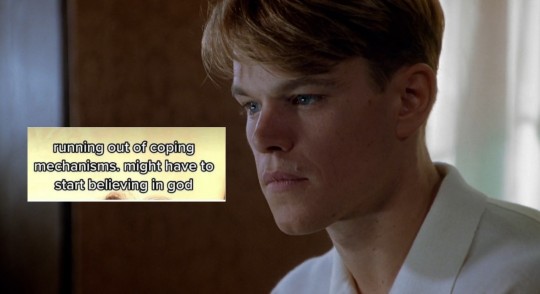

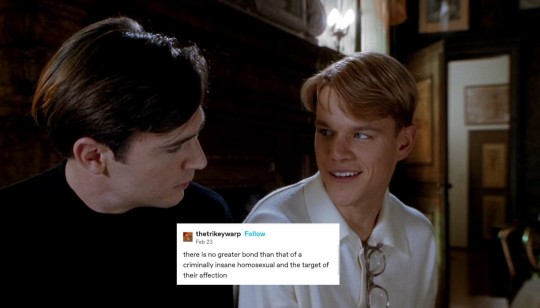
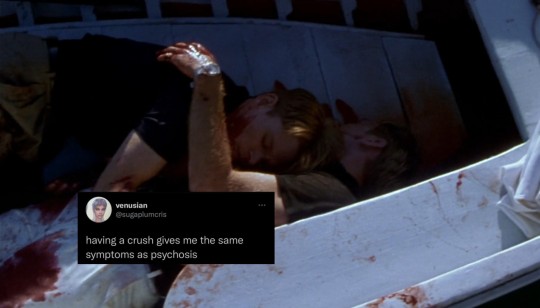
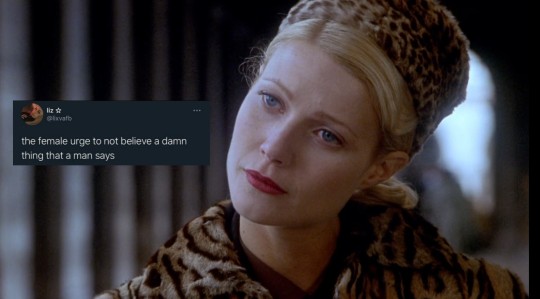
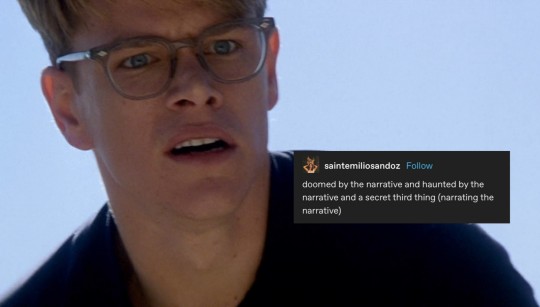
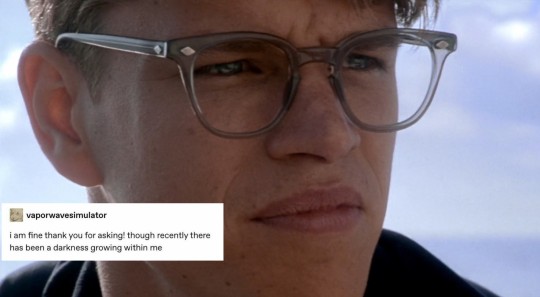
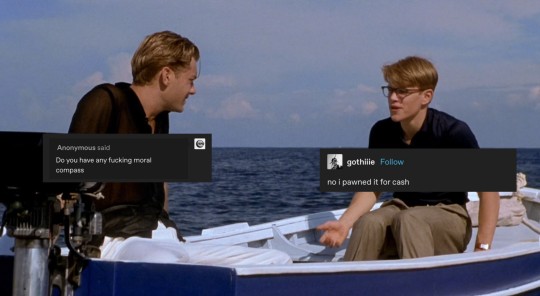

the talented mr. ripley (1999) x internet posts
#mine#the talented mr. ripley#tom ripley#peter smith kingsley#dickie greenleaf#marge sherwood#matt damon#jude law#jack davenport#films
145 notes
·
View notes
Text
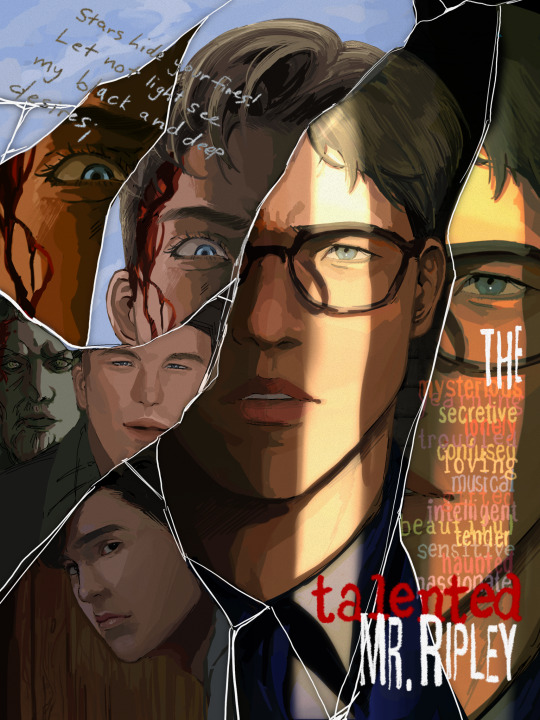
a tribute to my current favorite film. 🤍
#the talented mr. ripley#tom ripley#dickie greenleaf#freddie miles#peter smith kingsley#art#fanart#digital art#hey there art department
566 notes
·
View notes
Text
It has been YEARS since I watched "The Talented Mr. Ripley" for the first time and I'm still addicted to Jack Davenport ever since stupid Peter Smith-Kingsley stumbled into the frame.
This movie should have a warning solely dedicated to him.
Something like:
*beep boop beep*
"Attention viewer.
This movie contains:
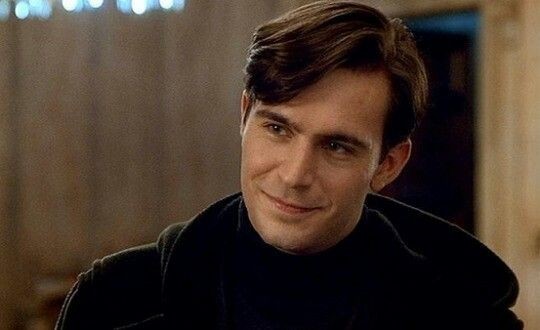
For some viewers,

might cause obsessive behaviour or extreme hyperfixation .
Please make sure you can handle

, before you continue watching.
*boop beep boop*
Would I have listened?
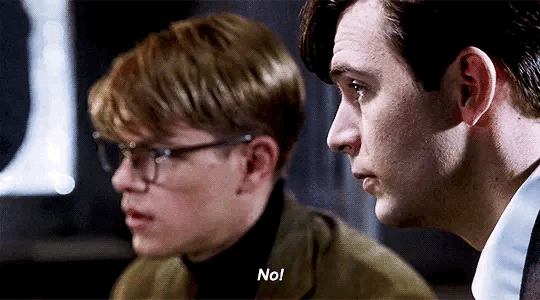
But a warning would have been nice, I guess?
#I'm still so mad at this movie#forget about Dumbledore getting clubbed by an oar#the REAL CRIME is giving us Peter just to take him away again#i'm not crying you are#jack davenport#peter smith kingsley#the talented mr. ripley
51 notes
·
View notes